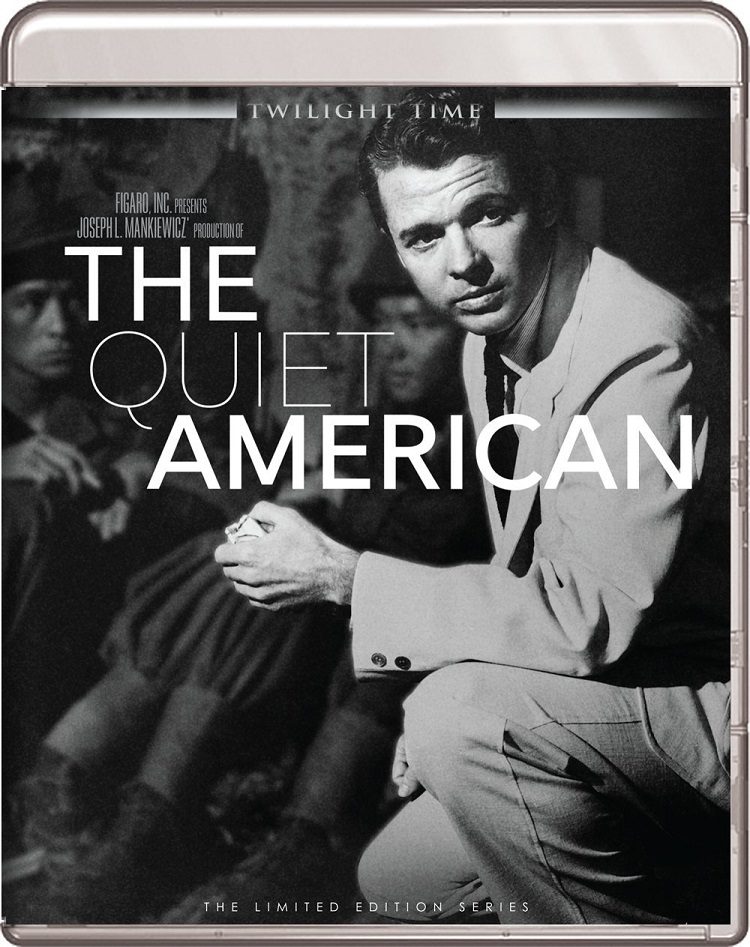
Based on bestselling author Graham Greene’s 1955 novel of the same name, Joseph L. Mankiewicz’s motion picture adaptation of The Quiet American has remained fairly silent since its debut in 1958. Though, when one notes the radical departure Mankiewicz’s screenplay takes from its anti-American source material and, more importantly, the pressure Hollywood was receiving from the witch hunters in D.C. at the time, it’s not all that surprising the film takes a decidedly pro-American view towards the subject matter. Ultimately, novelist Greene would publicly disavow the feature, though the dynamic dramatic quality of Mankiewicz’s film is not the sort of thing that is easily forgotten.
Set in Saigon before the end of the First Indochina War ‒ a confrontation that would later evolve into the Vietnam War, wherein I’m certain Graham Greene uttered the words “I told you so” ‒ The Quiet American opens with the discovery of a lifeless corpse amid joyous New Year’s festivities. The deceased, a reserved economist from the United States, had reportedly been in the area promoting international aid. But cynical British reporter Thomas Fowler (a truly mesmerizing Michael Redgrave), who frequently found himself in the company of the nameless, mysterious stranger ‒ and his shadowy politics ‒ has his doubts, which he reluctantly begins to unfold to the local authorities and the audience.
And once you meet The Quiet American in question ‒ as played in the flashbacks by quintessential American hero Audie Murphy (who wouldn’t take the part unless it was portrayed in a positive light, naturally) ‒ you may see part of Fowler’s reasoning. But only part. Regularly referring to a “third force” whenever the subject of war comes up (which is often, since they’re in one), Fowler immediately begins to suspect his Colonial counterpart of being a little more involved in the matter than he states; a suspicion that only grows as the suppressed Yankee miraculously manages to march through active war zones without any interference whatsoever, leading to several good-natured jabs.
All jokes aside, though, there’s another third force at play here which makes all the difference between the two male leads: a beautiful, younger local lass named Phuong (who, true to American filmmaking standards of the ’50s, is played by Italian actress Giorgia Moll). While Fowler has been living in sin with her for some time, he is unable to marry her due to the religious convictions of his estranged wife back in England; a complication that grows all the more convoluted when The Quiet American reveals he can be quite talkative when a hot and technically single dame is about. While he may not know what the Usonian is up to, Fowler has a self-motivated interest of his own to worry about: Phuong.
Despite its noticeable departures from Greene’s near-cautionary tale of American exceptionalism (Phillip Noyce stayed truer to the source material for his 2002 remake, although by that time, American politics had changed considerably), screenwriter/producer/director Joseph L. Mankiewicz’s The Quiet American is worthy of one’s respect in its own right. Take his more subtle approach to Greene’s tone, which underlines the bulk of the film (up until the ending, that is). Had it been placed in the hands of anyone else, the first filmic adaptation of The Quiet American would have probably been about as subtle as Michael Bay’s 13 Hours. So you can thank your lucky stars and stripes for that small blessing!
Twilight Time adds The Quiet American to its library of Limited Edition delights. Presented in a 1.85:1 widescreen transfer, the video aspect of this MPEG-4 AVC/1080p Blu-ray release is a gigantic improvement over the horrible non-anamorphic (and long out of print) MGM DVD released back in 2005, to the point where anyone who has seen both copies may find it hard to believe they’re the same film. The included DTS-HD Master Audio 1.0 soundtrack is about as close to perfection as we’re likely to get, and optional English (SDH) subtitles are on-hand.
A secondary audio option in DTS-HD MA 2.0 features composer Mario Nascimbene’s score as an isolated track, along with some sound effects. Sealing the deal are Julie Kirgo’s stand-out essay on this enthralling character study, which is included in the collectible booklet accompanied by a selection of stills. A titleless (thanks, MGM) but nevertheless High-Definition look at the theatrical trailer for the film is also attached to this release. The Twilight Time exclusive is limited to only 3,000 pressings, so be sure to speak up before this Quiet American goes silent again for good.